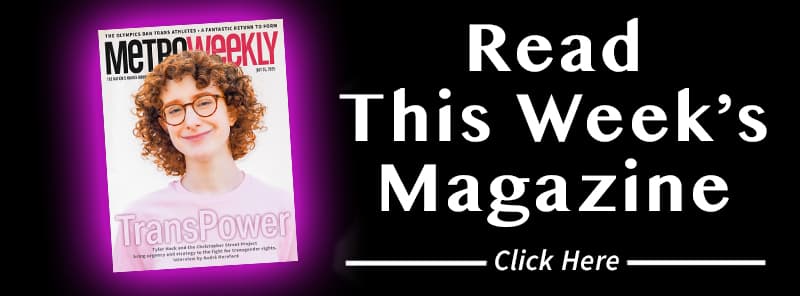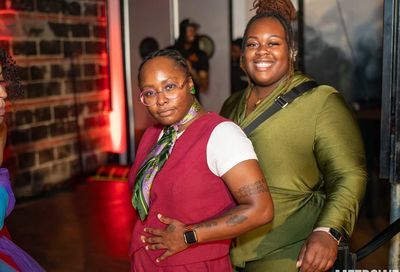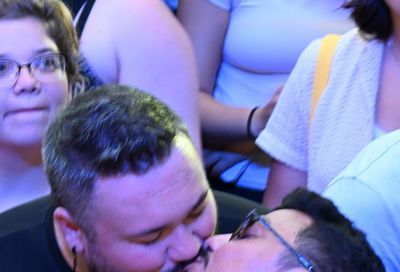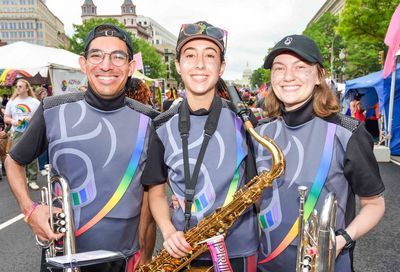Eurovision Bans Pride and Trans Flags
Performers in the international song competition may only now display the official flag of the country they represent.

The Eurovision Song Contest has banned performers from displaying Pride, Trans, and Nonbinary flags on its concert stage.
However, it has relaxed restrictions on the ability of audience members to wave political or identity-related flags.
The international music contest’s updated policy specifies that all flags and banners are permitted for audience members at the upcoming event, which runs May 13 to 17 in Basel, Switzerland, as long as those flags do not pose safety risks or break Swiss law.
Examples of types of flags that might violate this provision include those with racist, offensive, defamatory, or discriminatory content, symbols that incite hatred or violence, or those that represent banned terrorist organizations.
However, the policy requires that only one national flag can be displayed by performers and their delegations when they are in “official spaces,” such as the concert stage, the Green Room, the Eurovision Village stage, and the Turquoise Carpet at the opening ceremony.
During the flag parade, only one official flag provided by the Swiss Broadcasting Corporation, the host broadcaster, may be displayed by performers.
This means LGBTQ performers will not be able to display Pride-themed flags.
It also means that performers will not be able to display another country or territory’s flag in solidarity, such as the Palestinian flag or the Ukrainian flag.
A spokesperson for the Eurovision Song Contest said the flag ban for performers was developed by the Swiss Broadcasting Corporation, with input from the Eurovision Broadcasting Union.
The EBU said in a statement that the policy was intended to “strike a balance to ensure that our audiences and artists can express their enthusiasm and identities, whilst at the same time provide more clarity for the delegations when it comes to official spaces.”
A spokesperson defended the ban, noting that there are other opportunities for people to express pride in their identities or make political statements: “Outside of these official spaces, the flag policy for delegations is the same as for audiences, where all flags permitted under Swiss law can be used, including Pride flags, and provides plenty of opportunities for the expression of everyone’s identities.”
Country delegations and performers may face “consequences” if they violate the policy.
It is unclear what those consequences are.
The flag ban highlights the conflict between maintaining political neutrality and the ability of artists to express themselves freely or make statements about current events.
In past years, several artists have carried Pride or transgender flags during the flag parade, including S10, a singer-rapper from the Netherlands, Australia’s Sheldon Riley, and Iceland’s Systur band.
Switzerland’s Nemo, who won last year’s contest, said they had to smuggle in the nonbinary flag they had displayed on stage after Eurovision told them it wouldn’t be permitted.
Last year’s Eurovision contest was overshadowed by massive pro-Palestinian protests calling for Israel to be prohibited from competing due to its military campaign in the Gaza Strip, which is estimated to have led to the deaths of more than 51,000 people.
That campaign was launched in response to a 2023 Hamas-led attack on Israel that killed nearly 1,200 people and saw over 250 others taken captive by Palestinian nationalist Islamist terrorists.
Eurovision briefly banned Israel from performing last year because its song choice broke the rules on political neutrality by containing lyrics referring to the Hamas-led attack. The ban was lifted after Israel changed the lyrics and the title.
Russia was banned in 2022 following its invasion of Ukraine and has not returned to the competition in subsequent years.
The ban on Pride flags on the official concert stage has inflamed tensions and sparked outrage from LGBTQ advocates, who have denounced the policy for unfairly restricting expressions of identity.
Maria Sjödin, executive director of the LGBTQ rights advocacy group OutRight International, told CNN that Eurovision has “long been an important space for the LGBTIQ community” and that “both artists and audiences should be free to celebrate that openly.”
“Limiting expressions of support for equality — through flags, colors, or words — weakens the spirit of Eurovision, which thrives on diversity, creativity, and freedom,” Sjödin said.
Support Metro Weekly’s Journalism
These are challenging times for news organizations. And yet it’s crucial we stay active and provide vital resources and information to both our local readers and the world. So won’t you please take a moment and consider supporting Metro Weekly with a membership? For as little as $5 a month, you can help ensure Metro Weekly magazine and MetroWeekly.com remain free, viable resources as we provide the best, most diverse, culturally-resonant LGBTQ coverage in both the D.C. region and around the world. Memberships come with exclusive perks and discounts, your own personal digital delivery of each week’s magazine (and an archive), access to our Member's Lounge when it launches this fall, and exclusive members-only items like Metro Weekly Membership Mugs and Tote Bags! Check out all our membership levels here and please join us today!
























You must be logged in to post a comment.